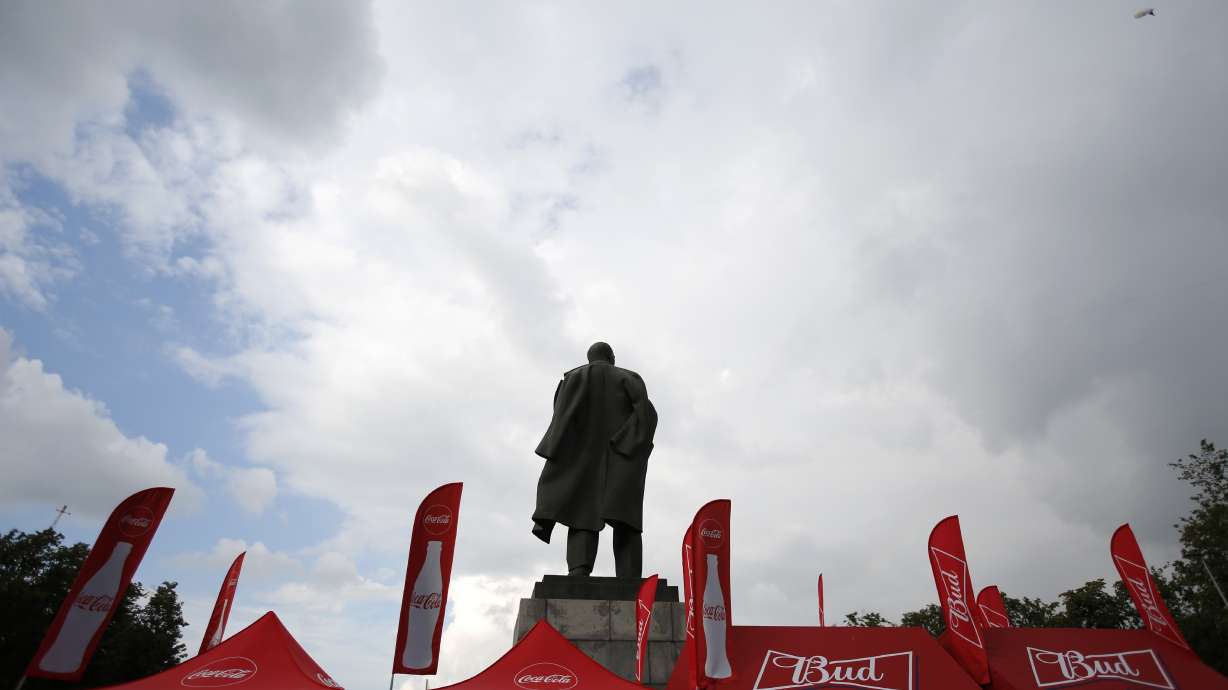Estimated read time: 4-5 minutes
This archived news story is available only for your personal, non-commercial use. Information in the story may be outdated or superseded by additional information. Reading or replaying the story in its archived form does not constitute a republication of the story.
MOSCOW (AP) — When Lenin had a thirst for revolution, this is not what he had in mind.
Fans attending Sunday's World Cup final between France and Croatia will pass a huge statue of the Bolshevik Revolution's leader as they enter the Luzhniki Stadium. Abutting the rear of the monument is a Budweiser concession stand with a sign proclaiming: "Drink smart today — celebrate tomorrow."
Not exactly "no freedom can satisfy the masses suffering from hunger," as Lenin wrote in 1917.
"I think that Lenin has rolled over in his grave so many times in the last 25 years that there's probably friction burns on his corpse," said Keith A. Darden, associate professor in the school of international service at American University in Washington.
On the front side of the sculpture sits another stand topped by a Visa advertisement, filled with World Cup licensed merchandise that include hoodies for 6,000 rubles ($96).
"Lenin would not like it one bit," said Sergei Antonov, an assistant professor in the Yale history department who specializes in Russia and the Soviet Union after 1800 and the global history of capitalism.
Constructed in 1955-56, the venue originally was called Central Lenin Stadium. Its appellation was the nom de guerre of Vladimir Ilyich Ulyanov, leader of the October 1917 revolution. Lenin's 26-foot (8-meter) bronze sculpture was created by Matvey Manizer for Expo 58 in Brussels, where it was installed in front of the Soviet Union pavilion. It was moved to the stadium in 1960 and placed atop a polished granite pedestal almost as tall as the statue.
Site of the 1980 Olympics that the United States boycotted following the Soviet invasion of Afghanistan, the stadium hosted a 1982 UEFA Cup match between Spartak Moscow and Haarlem at which 66 spectators died in a stampede.
The venue was renamed Luzhniki Stadium in 1992, a year after the dissolution of the Soviet Union, and the new name is the Russian word for meadows. The 2008 Champions League final and 2013 track and field world championships were held there, and an almost entirely new stadium was built on the site for the World Cup, one without a track.
The path to the stadium from the Sportivnaya Metro station is filled with displays erected by FIFA partners and sponsors.
"Under the socialism, capitalism mixed together," Gustavo Briseno, a 35-year-old fan from Mexico City said by the statue before a group stage match.
In Red Square, about 5 miles (8 kilometers) from the stadium and a short distance from Lenin's tomb, FIFA and local organizers opened a temporary Football Park with games and amusement rides — and abundant corporate signage. It is near a string of boutiques for the haute bourgeoisie that include Cartier, Hermes, Tiffany and Versace.
"Lots of sort of stark contrasts," said Mauricio Borrero, an associate professor in history at New York's St. John's University who is working on a biography of Soviet goalkeeper Lev Yashin. "Certainly the disparity, the contrast between the very wealthy people and the ones who sort of barely get by, that's something that bothered him back in the early 20th century, would certainly bother him again.
"I think one thing you saw in the Soviet years was there wasn't such a huge gap between the very wealthy and the very powerful and most of the people. It's not that those disparities did not exist, it's just that they weren't visible."
Antonov, who grew up in Moscow and moved to the U.S. in 1992, said commerce involving small business survived through most of the communist era.
"They weren't always treated very well, and there were all kinds of restrictions, but the idea was always there," he said. "Private enterprise would be allowed in some form or other."
Darden said the long-term impact of the World Cup may be to partly change the view of the nation held by those who visited.
"I think there's a tendency to think of Russia as this sort of gray dictatorship with bread lines and misery, sort of the babushka with her broom as the symbol of this country," he said. "Russia is in fact stereotyped, so people who traveled to Russia confronted a much more complex, dynamic society than the version they get on television."
___
More AP World Cup coverage: https://apnews.com/tag/WorldCup
Copyright © The Associated Press. All rights reserved. This material may not be published, broadcast, rewritten or redistributed.








